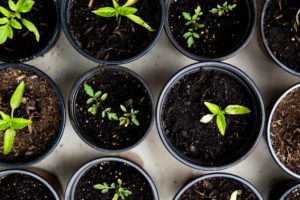
(Photo Source: westburygardenrooms.com)
Start planing now, and enjoy the efforts forever!
Early spring is the perfect time to start creating your vegetable garden. Just before that, during cold and dull winter months, you should do all the preparations.
To make sure everything runs smoothly, the first thing to do is to determine the size of the plot you want to create. A large vegetable garden means much more preparations and actual work, than a smaller one. Try to pick a spot with a lot of sunshine and ideally one that appreciates the morning sun, and from six to eight hours of direct sunlight every day. If you don’t have these conditions, some crops tolerate shade, such as cherries, blackberries, raspberries, rhubarb, and blackcurrants.
The next step is testing the soil. More accurately, Test the pH levels of the ground of the spot you chose for your vegetable garden. Depending on pH levels, whether your soil is acid or alkaline, you’ll know if you need more moisture and nutrients.
Each plot is different, so work out the best plan for your space and requirements. There are no simple rules for designing a kitchen garden. You can mix vegetables, fruit, herbs, and flowers, including delicious varieties, all jostling together in a tapestry of colors and shapes, in separated rows or blocks, or as a decorative potager, in a geometric pattern of your choice. Make the best use of the vertical space by applying simple vertical garden rules. Grow climbers, like peas, beans, and cucumbers upholders and climbing frames.
During February, you can start planting beans, peas, carrots, onions, the first potatoes. Salads can also be planted year-round, so don’t hesitate or avoid garden work just because it’s still winter. To maintain your kitchen garden in the best shape possible, learn to the garden by month, and don’t be afraid to experiment. Some plants enjoy the closeness; others are loners.
By creating a kitchen garden, you’ll be able to make delicious meals, while saving money on food. It is an investment, and it requires a lot of effort, but in the long run, this is the best decision for you and your family.







